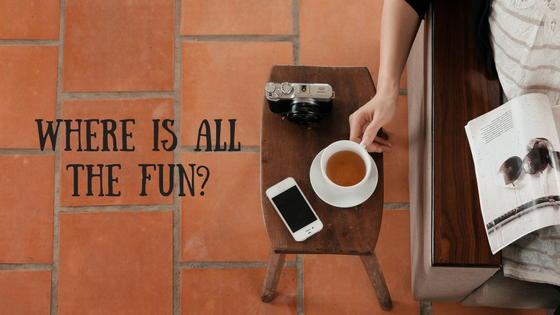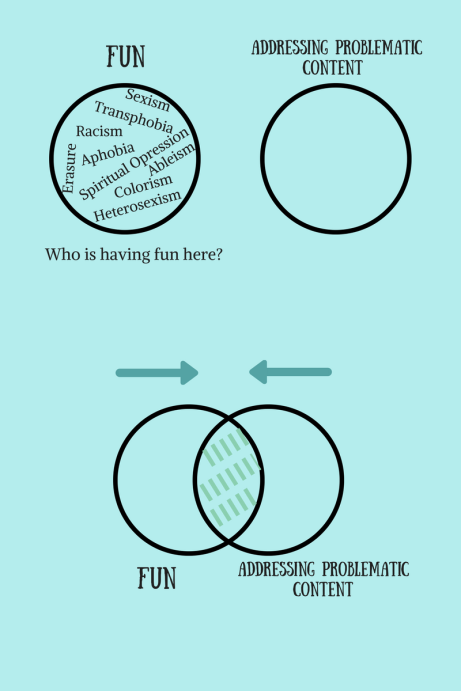
Playing board games, reading books, and writing on my blog are my hobbies. In essence, if I am not working, I am usually doing one of those three things. They provide me with time to relax, destress, and interact with my friends and family. I have fun in all three of my hobbies. Because of my work and issues I find important, my blogging life has focused a lot on inclusion, equity, and social justice in my hobbies. I see two main pieces here: 1) boosting and supporting marginalized authors, bloggers, content creators, designers, and publishers. 2) Calling out problematic content in both books and board games. Despite the dialogues I aspire to create, despite the resistance and frustration I feel in the face of an industry built on privilege, I still have fun. So why did this all come up?
The past couple of days, Shauna, from Bookstore Babe, thread tweeted and then wrote a >8K book review on THE BLACK WITCH a new book by Laurie Forest. After reading the thread and the review, it was evident the book is terribly harmful in many ways – racist, ableist, homophobic. Like most ‘call outs,’ many people in the book blogging world and on book Twitter jumped to defend the author, while others spread awareness of the harm conveyed in the book. And like many of these ongoing conversation, there were a lot of hate and personal attacks going in both directions. I will not talk about THE BLACK WITCH here. As I understand, the author had the best intentions when writing the book, using it to address problematic issues, but the result did not live up to the intention. I have not read the book and I do not plan to ever. If you want to find out more about the book, please go find the many critical reviews. What I want to talk about is a common refrain I heard in the past week:
Where did all the fun go in this hobby?
I see this common response of exasperation, mostly from folks defending the problematic content in both of the hobbies I am a part of. “This hobby is not fun anymore.” “I just want to play games, not talk about politics.” “I want to read whatever I want to read.” Sounds familiar? Maybe you have heard this in your community. Maybe you have said one of these phrases or something similar. Maybe you have not noticed this phenomenon. Whatever the case may be, as soon as problematic content is addressed usually someone who wants folks to lighten up and let it go comes out of the woodwork – it’s just a game, it’s just a made up story, have fun. For me, I interpret these statements as an attempt to say having fun in the hobby and addressing problematic content are mutually exclusive. Once we start talking about ‘identity politics’ the fun is sucked out of it. Let me be completely honest as someone who holds marginalized identities: there are many times where I cannot have fun because of the power dynamics that exist in the industries and interpersonally in my game groups. Below, I created a Venn Diagram that helped me think through some of these ideas.

The top Venn Diagram is my visual representation of folks saying, “Where did the fun go?” As you probably noticed, in the Fun circle I have listed a variety of oppressions and issues that plague both hobbies. I want to be extremely clear: these oppressions are not a matter of opinion; however we experience oppressive systems differently based on the identities we hold. Under the circle, I ask the question, who is really having fun in this model? In my opinion, it is the folks who do not have to deal with all of that. The folks who do not have to think about racism or sexism or terrible representation or insert other issue. Folkx who hold marginalized identities do not have the privilege of ignoring those issues to have fun. We can’t read a book like THE BLACK WITCH or play a game like WAKA TANKA and say… “That was fun despite the racism!”
I think there is also a stereotype about folkx calling out problematic content. That is all we do. I personally would love a world where I did not have to call anything out. A world where I could just have fun and not worry about racism or other oppression in the hobbies. I don’t think most people do this work because they like arguing or they ‘want to ruin a career’ or they are just doing it to create drama. Most people do this work because these issues personally impact them, tell them they are not valued in the hobby, and cause real harm. Marginalized people want to have fun! It’s a fact! And, despite all the work to call out problematic content, I and many others do have fun. That brings me to the second Venn Diagram on the graphic.
There is an intersection of standing for inclusion in these hobbies and having fun. And as we continue to address problematic content and get better at actually making changes, the intersection grows and grows. Until one day they are the same circle. We cannot have a truly inclusive space of all people until we welcome critical feedback about problematic content. I think a question we need to ask ourselves… Why do I feel like folks addressing problematic content the opposite of fun? I can go on about the different answers I think that apply (apathy, privilege, ignorance). BUT I cannot do the self-awareness piece for you. You may not like the answer to that question. I know I did not and still feel personal resistance when confronting my own biases and socializations when it comes to my privilege. That feeling does not exempt me from taking responsibility to change and it most certainly does not exempt me from responsibility for the harm I caused.
The fun is still there. Trust me. Fun is also a privilege in broader community. Privileged folks are most definitely having fun and will continue to regardless of what happens. Oppressive systems hinder full participation of marginalized folkx in these hobbies. So, why are we calling this stuff out? To prevent harm in a hobby we love and to create an inclusive space where we feel welcomed to have fun.
Great post! I am still having fun too.
LikeLiked by 1 person
Posted by A.M.B. | March 22, 2017, 3:54 PMYay happy to hear it! 🙂
LikeLiked by 1 person
Posted by Brendon | March 23, 2017, 2:22 PMGreat post.
Ain’t nobody stopping them from having fun.
It’s possible to still have fun and be critical and highlight problematic things in the media we consume. The question those peeps should be asking is why are these fun books so damn problematic and what can be done to ensure they’re better written.
LikeLiked by 1 person
Posted by Zezee | March 22, 2017, 8:10 PMSpot on question! And why are all their faves the problematic ones?! Thank you for stopping by and commenting!
LikeLike
Posted by Brendon | March 23, 2017, 2:23 PM